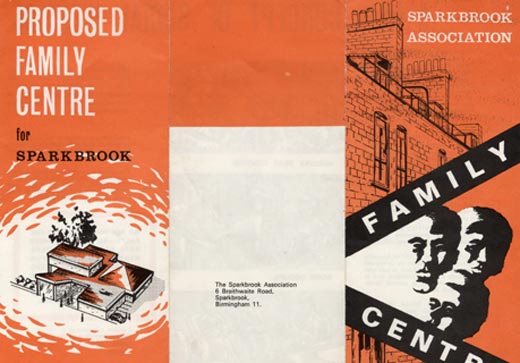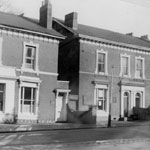
Introduction
The Importance of the Family
A New Concept in Social Welfare
Services for the Community
The Importance of Play
Directions for Learning
Introduction
Whilst decent housing was recognised as key to an improvement in the lives of people in Sparkbrook, Birmingham and beyond, it was not the only solution to the problems of 'juvenile delinquency,' vandalism, poor health and other social 'disorders' that the Sparkbrook Association wanted to address. The rise of Feminism during the 1960s and 70s brought about considerable social change in Britain that saw revolutions in gender relations and the form of traditional family units. Added to this, in urban areas such as Sparkbrook the experience of acute overcrowding, where migrants from the Commonwealth had settled, was believed to cause an increase in tensions in the domestic setting.
<return to top>
The Importance of the Family
Members of the Sparkbrook Association believed that many of the social problems affecting Sparkbrook were linked to the 'disintegration' of the family. They held the belief that social problems could be remedied by improving the emotional well-being of children and strengthening the family unit. If families were stable, it was thought, a harmonious society would follow. Dr Barrow's speech at the opening of the Family Centre on 20th November 1968 reveals the Association's strong commitment to the preservation of the family as the prime source of social stability:
"We seek to preserve the most important of all social organisations: the family, because we know from experience, that without a secure and sane family life children cannot work effectively in school, men cannot work effectively in their factories and offices and women can neither live nor work in home or workplace as they might. Bad families produce bad citizens. Irresponsible parents produce irresponsible children. Broken homes produce broken lives. But good homes produce good citizens. Good parents produce happy, healthy people".
<return to top>
A New Concept in Social Welfare
The Family Centre, which was promoted as a 'new concept in social welfare' placed the welfare of the family at its core and its purpose was to unite the work of social, medical, educational and welfare workers under one roof so that problems could be tackled jointly and more effectively. From its site at the corner of Farm Road and Sampson Road, it provided simple facilities such as a family advice centre, a nursery, rooms for voluntary and statutory organisations and a hall for clubs and social occasions to take the strain off many parents who were feeling drained by their social and economic situation. Mothers living in overcrowded lodgings who had to "tramp the streets in the daytime with their children so that their husbands on night shift could sleep" were envisaged as among the typical beneficiaries of the centre.
The three main aims of the Family Centre were:
- to achieve "a general rise in children's emotional stability, social adjustment and resilience to psychological strain…"
- to help families through periods of temporary strain and crisis; and
- to improve the quality of child care for 'underprivileged' children and prevent the 'disintegration of the family unit.'
The activities of the centre were thought to solve the 'basic human problems' of loneliness, isolation, misunderstanding and separateness afflicting people of all ages and backgrounds in Sparkbrook. However, the Association's reliance on a conservative model of the 'good family' consisting of a husband, wife and child(ren), mean that its attitudes towards those that did not fit this model often tend to appear condescending. Its use of terms such as 'incomplete' and 'problem' families in their literature, which many people may not find acceptable today, is reflective of both a class bias and typical attitudes towards parenting that were prevalent during the 1960s. Nevertheless, by bringing people together in a common space and by 'learning to know one another and care for one another', the Family Centre played a crucial role in connecting people, promoting equality and creating a sense of community.
<return to top>
Services for the Community
In addition to the Family Centre, the Sparkbrook Association provided a number of other services which contributed to the welfare of members of the local community. After the Association was launched, Elizabeth Tompkins - the organisation's first paid worker who operated out of her flat before Braithwaite Road was acquired - was inundated with enquiries from local residents concerning a broad range of issues from housing problems, to loneliness and neighbour disputes. Initially much of her time involved individual case work. A Citizens Advice Bureau was opened in February 1963 at Braithwaite Road to deal with concerns and to provide advice and information. The Association also provided social and luncheon clubs for older residents, a Mental Health club, mother and baby groups and play centres for children who had no space to play in the home.
<return to top>
The Importance of Play
Prior to the establishment of the Association, Dr Barrow is reported to have found children of about 2 or 3 years old unable to walk properly because their only play area in multi-occupied homes was the bed. Lack of space was recognised as having a detrimental effect upon the physical and educational growth of children and the Association succeeded in obtaining grants from the Save the Children Fund to create four play centres. In providing play centres, the Association created spaces which were not only beneficial to the children in encouraging them to grow and develop socially, but to their parents as well. Papers in the archive collection describe how play centres helped mothers living in crowded conditions with very small children by providing some respite. In particular, play centres could provide an opportunity for migrant mothers to adapt to life in Birmingham: "They aim also to draw into the community and teach, through the children, a new way of life to immigrants from Europe, the Far East and the West Indies".
The provision of welfare services by the Sparkbrook Association represent gains for social justice for people in Sparkbrook who were experiencing social and economic hardship mainly as a result of their environment. Although these gains were small and localised, they were significant. In providing space to play, overcome isolation, and promote 'family life', the Sparkbrook Association provided innovative and practical solutions which contributed to an improved quality of life for many local people.
<return to top>
Directions for Learning
The Sparkbrook Association was not the only organisation working in Birmingham to provide welfare services to the local community. The Sparkbrook Association's voluntary work reports and newsletters (MS1914/1/5/3/1; MS1914/8/1) refer to a number of groups including the Pakistani Sports and Welfare Association, the West Indian Association and the Pakistani Welfare Association. You may wish to take these as a starting point from which to discover more about their work.
<return to top>
Author: Sarah Dar
Image: Leaflet for the Sparkbrook Association Family Centre
[Birmingham City Archives: MS 1914/1/6/1]
|
|

Creating Space
for Play

A Home for the Association
|